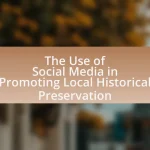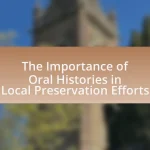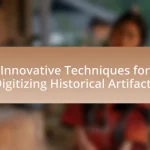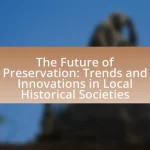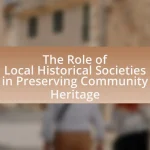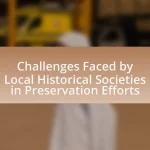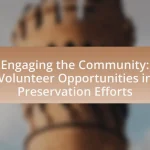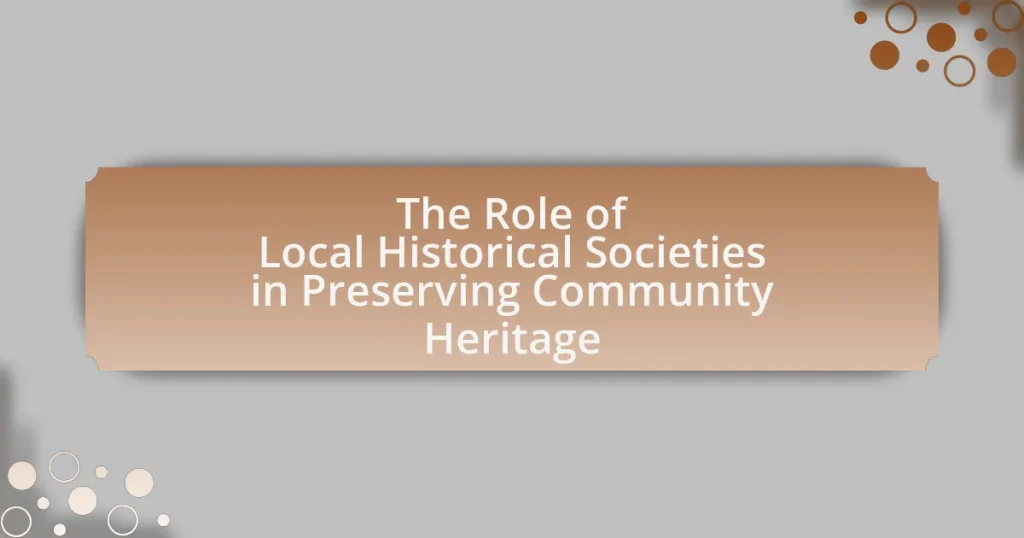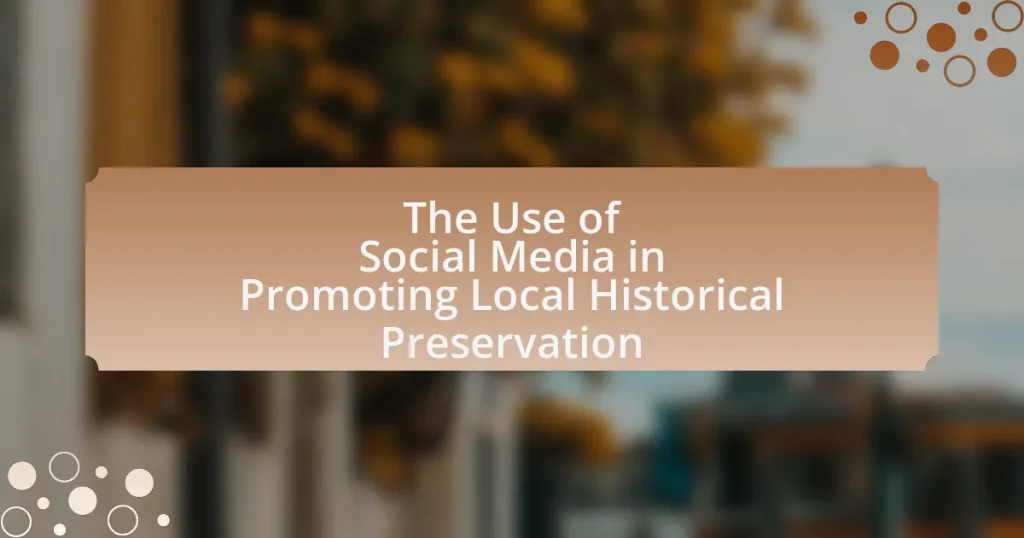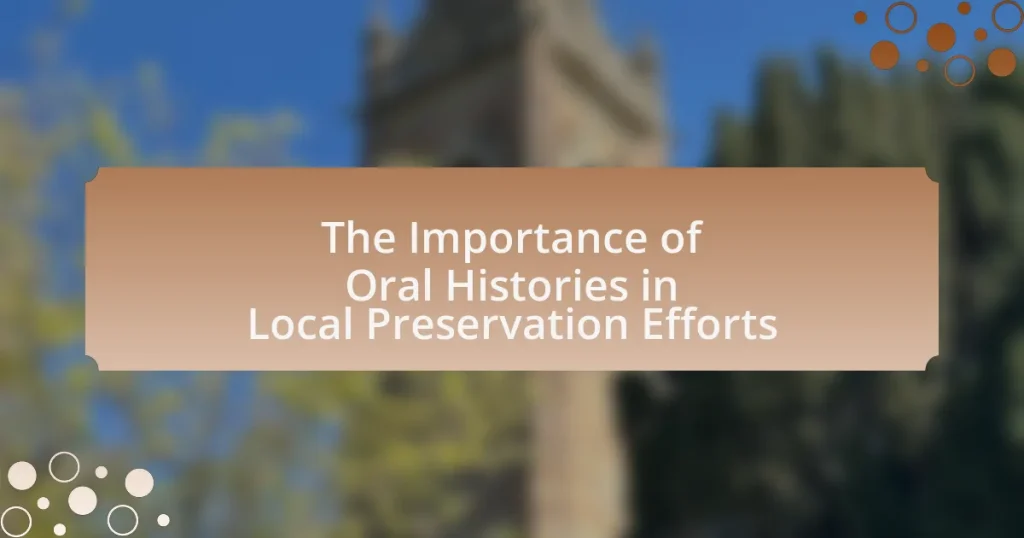Local historical societies are organizations focused on preserving and promoting the history and heritage of specific communities. They collect, preserve, and interpret historical artifacts, documents, and narratives, while also engaging in educational activities to raise awareness about local history. The article explores the contributions of these societies to community heritage preservation, their collaborative efforts with other organizations, the importance of volunteerism, and the challenges they face, including funding shortages and public engagement. Additionally, it discusses strategies for enhancing community involvement and the resources available to improve their impact on preserving local heritage.
What are Local Historical Societies and Their Purpose?
Local historical societies are organizations dedicated to preserving and promoting the history and heritage of specific communities. Their primary purpose is to collect, preserve, and interpret historical artifacts, documents, and narratives that reflect the unique cultural and historical identity of the area they serve. These societies often engage in educational activities, such as organizing lectures, workshops, and exhibitions, to raise awareness about local history among residents and visitors. Additionally, they may collaborate with other institutions, such as schools and museums, to enhance historical education and community engagement. The existence of over 1,800 local historical societies in the United States underscores their significance in maintaining community heritage and fostering a sense of identity among residents.
How do Local Historical Societies contribute to community heritage preservation?
Local Historical Societies contribute to community heritage preservation by actively documenting, researching, and promoting local history. These organizations often collect artifacts, photographs, and documents that reflect the unique cultural narratives of their communities, ensuring that historical knowledge is maintained for future generations. For example, many societies conduct oral history projects that capture the experiences of long-time residents, thereby enriching the community’s historical record. Additionally, they frequently host educational programs, workshops, and events that engage the public and raise awareness about local heritage, fostering a sense of identity and continuity within the community.
What specific activities do these societies engage in to fulfill their mission?
Local historical societies engage in activities such as organizing educational programs, conducting research, and preserving artifacts to fulfill their mission of preserving community heritage. These societies often host workshops, lectures, and exhibitions that educate the public about local history and culture. They also collect and archive historical documents, photographs, and objects, ensuring that significant community narratives are maintained for future generations. Additionally, many societies collaborate with schools and other organizations to promote awareness and appreciation of local heritage, thereby fostering a sense of community identity and continuity.
How do Local Historical Societies collaborate with other organizations?
Local Historical Societies collaborate with other organizations through partnerships, joint events, and resource sharing. These collaborations often involve working with schools, museums, and cultural institutions to promote local history and heritage. For example, societies may co-host educational programs or exhibitions that highlight significant historical events or figures in the community. Additionally, they may engage in grant applications together to secure funding for preservation projects, thereby enhancing their capacity to protect and promote local heritage. Such collaborative efforts not only strengthen community ties but also amplify the impact of historical preservation initiatives.
Why are Local Historical Societies important for community identity?
Local historical societies are important for community identity because they preserve and promote the unique history and cultural heritage of a community. By collecting artifacts, documents, and oral histories, these societies create a repository of local narratives that foster a sense of belonging and continuity among residents. For instance, studies have shown that communities with active historical societies often report higher levels of civic engagement and pride, as these organizations facilitate educational programs and events that connect residents to their shared past. This connection to history not only enhances community identity but also encourages the preservation of local traditions and values, reinforcing the social fabric of the community.
In what ways do they foster a sense of belonging among community members?
Local historical societies foster a sense of belonging among community members by organizing events that celebrate local history and culture. These events, such as heritage festivals, workshops, and lectures, encourage participation and engagement, allowing individuals to connect with their shared past. For instance, a study by the American Association for State and Local History found that communities with active historical societies report higher levels of civic engagement and social cohesion. Additionally, these societies often create opportunities for storytelling and sharing personal histories, which strengthens interpersonal connections and reinforces community identity.
How do they educate the public about local history?
Local historical societies educate the public about local history through various methods such as organizing educational programs, hosting workshops, and providing access to historical archives. These societies often conduct guided tours of historical sites, which allow participants to engage directly with the community’s heritage. Additionally, they publish newsletters and maintain websites that feature articles, photographs, and resources related to local history. For example, many societies collaborate with schools to integrate local history into the curriculum, enhancing students’ understanding of their community’s past. These initiatives are supported by research indicating that community engagement in historical education fosters a stronger sense of identity and belonging among residents.
What Challenges do Local Historical Societies Face?
Local historical societies face several challenges, including funding shortages, volunteer recruitment, and public engagement. Funding is often limited, as many societies rely on donations and grants, which can fluctuate and are not always guaranteed. This financial instability can hinder their ability to maintain facilities, preserve artifacts, and conduct educational programs. Additionally, attracting and retaining volunteers is difficult, as many societies depend on community members who may have limited time or interest in historical preservation. Lastly, engaging the public and raising awareness about their mission can be challenging, especially in an era where digital media competes for attention, making it harder to draw visitors to events and programs. These challenges collectively impact the effectiveness of local historical societies in preserving community heritage.
How do funding issues impact the operations of Local Historical Societies?
Funding issues significantly hinder the operations of Local Historical Societies by limiting their ability to maintain facilities, conduct research, and offer educational programs. Insufficient financial resources often result in reduced staffing, which directly affects the society’s capacity to engage with the community and preserve local heritage. For instance, a study by the American Association for State and Local History found that 60% of historical societies reported budget constraints as a major challenge, leading to decreased public programming and outreach efforts. Consequently, these funding challenges can diminish the overall effectiveness of Local Historical Societies in fulfilling their mission to preserve and promote community heritage.
What are the common sources of funding for these societies?
Common sources of funding for local historical societies include grants, membership fees, donations, and fundraising events. Grants are often provided by government agencies, foundations, and nonprofit organizations specifically aimed at preserving cultural heritage. Membership fees contribute to the operational budget, while donations from individuals and businesses support specific projects or general expenses. Fundraising events, such as auctions or community gatherings, also generate revenue and foster community engagement. These funding sources are essential for the sustainability and effectiveness of local historical societies in their mission to preserve community heritage.
How can societies overcome financial challenges?
Societies can overcome financial challenges by diversifying their funding sources. This approach includes seeking grants, forming partnerships with local businesses, and engaging in community fundraising initiatives. For instance, historical societies often apply for grants from government agencies and private foundations dedicated to cultural preservation, which can provide significant financial support. Additionally, collaboration with local businesses can lead to sponsorship opportunities, enhancing financial stability while promoting community engagement. Engaging the community through fundraising events not only raises funds but also fosters a sense of ownership and support for local heritage initiatives.
What role does volunteerism play in the success of Local Historical Societies?
Volunteerism is essential for the success of Local Historical Societies as it provides the necessary manpower and diverse skills to manage projects, organize events, and maintain historical sites. Volunteers contribute significantly to research, curation, and educational outreach, which are critical for preserving community heritage. For instance, a study by the National Trust for Historic Preservation found that volunteer-led initiatives can increase community engagement and funding opportunities, demonstrating that active volunteer participation directly correlates with the effectiveness and sustainability of these societies.
How do societies recruit and retain volunteers?
Societies recruit and retain volunteers by creating engaging opportunities, fostering a sense of community, and providing recognition for contributions. Engaging opportunities include meaningful projects that align with volunteers’ interests and skills, which enhances their commitment. Fostering a sense of community involves building relationships among volunteers and between volunteers and the organization, often through social events and collaborative activities. Recognition can take the form of awards, public acknowledgment, or simple expressions of gratitude, which reinforces volunteers’ value to the society. Research indicates that organizations with strong volunteer management practices, such as clear communication and support, experience higher retention rates, demonstrating the effectiveness of these strategies in maintaining volunteer involvement.
What skills do volunteers bring to Local Historical Societies?
Volunteers bring a diverse set of skills to Local Historical Societies, including research, organizational, communication, and technical skills. Research skills enable volunteers to gather and analyze historical data, which is essential for preserving community heritage. Organizational skills help in managing events, archives, and collections effectively, ensuring that historical materials are well-maintained and accessible. Communication skills facilitate outreach and education efforts, allowing societies to engage with the community and share their findings. Technical skills, such as digital archiving and social media management, enhance the society’s ability to reach broader audiences and preserve history in modern formats. These combined skills significantly contribute to the mission of Local Historical Societies in documenting and celebrating local heritage.
How can Communities Support Local Historical Societies?
Communities can support local historical societies by providing funding, volunteering time, and promoting awareness of their activities. Financial contributions from community members and local businesses can help sustain the operational costs of historical societies, which often rely on donations and grants. Additionally, volunteers can assist with organizing events, maintaining archives, and conducting research, thereby enhancing the society’s capacity to preserve local heritage. Furthermore, communities can raise awareness by attending events, sharing information on social media, and encouraging participation in programs, which can increase membership and engagement. These actions collectively strengthen the role of historical societies in preserving community heritage.
What are effective ways for community members to engage with their Local Historical Society?
Community members can effectively engage with their Local Historical Society by participating in events, volunteering for projects, and contributing to local history research. Participation in events such as lectures, workshops, and exhibitions fosters a deeper understanding of local heritage and encourages community interaction. Volunteering for projects, like archival work or organizing community events, allows individuals to contribute their skills while supporting the society’s mission. Additionally, contributing to local history research, whether through sharing personal stories, artifacts, or photographs, enriches the society’s resources and strengthens community ties. These methods not only enhance the society’s efforts in preserving heritage but also empower community members to take an active role in their local history.
How can local businesses contribute to the success of these societies?
Local businesses can contribute to the success of historical societies by providing financial support, resources, and community engagement. Financial contributions from local businesses can help fund preservation projects, events, and educational programs that promote community heritage. For example, businesses can sponsor local historical events or donate a portion of their sales to support society initiatives. Additionally, local businesses can offer in-kind donations, such as materials or services, which can significantly reduce costs for historical societies. Engaging with the community through partnerships and collaborations can also enhance visibility and participation in historical society activities, fostering a stronger connection between the business and the community. This symbiotic relationship not only aids in preserving local heritage but also strengthens the local economy and community identity.
What events can communities organize to raise awareness and support?
Communities can organize educational workshops and historical reenactments to raise awareness and support for local heritage. Educational workshops can focus on teaching community members about their history, traditions, and the importance of preservation, while historical reenactments can engage the public by bringing history to life, fostering a deeper connection to their heritage. These events not only inform participants but also encourage community involvement and pride, which are essential for the ongoing support of local historical societies.
What best practices can Local Historical Societies adopt for sustainability?
Local Historical Societies can adopt best practices for sustainability by implementing community engagement initiatives, diversifying funding sources, and enhancing digital preservation efforts. Community engagement initiatives, such as educational programs and local history events, foster public interest and participation, which can lead to increased membership and support. Diversifying funding sources, including grants, donations, and partnerships with local businesses, ensures financial stability and reduces reliance on a single income stream. Enhancing digital preservation efforts, such as digitizing archives and utilizing social media, increases accessibility to historical resources and attracts a broader audience, thereby promoting long-term sustainability. These practices are supported by studies indicating that engaged communities and diversified funding models significantly contribute to the longevity and impact of historical societies.
How can technology enhance the preservation efforts of Local Historical Societies?
Technology can enhance the preservation efforts of Local Historical Societies by providing advanced tools for digitization, archiving, and public engagement. Digital archiving allows societies to create high-quality, accessible records of artifacts and documents, ensuring their preservation against physical degradation. For instance, using 3D scanning technology, societies can create detailed digital models of historical objects, which can be shared online, thus broadening access and educational opportunities. Furthermore, social media platforms and websites enable societies to engage with the community, share stories, and promote events, fostering a greater appreciation for local heritage. Studies have shown that communities with active digital engagement see increased participation in preservation activities, highlighting the effectiveness of technology in enhancing these efforts.
What strategies can be implemented to increase community involvement?
To increase community involvement, local historical societies can implement strategies such as organizing engaging events, fostering partnerships with schools, and utilizing social media for outreach. Engaging events, like heritage festivals or workshops, attract community members and promote participation. Collaborating with schools enhances educational programs, encouraging students and families to engage with local history. Additionally, using social media platforms effectively can reach a broader audience, facilitating communication and inviting community members to participate in activities. These strategies have been shown to enhance community engagement, as evidenced by successful initiatives in various localities that have increased attendance and participation rates in historical society events.
What resources are available for Local Historical Societies to improve their impact?
Local Historical Societies can improve their impact through various resources such as grants, training programs, and partnerships with educational institutions. Grants from organizations like the National Endowment for the Humanities provide funding for projects that enhance community engagement and preservation efforts. Training programs offered by the American Association for State and Local History equip society members with skills in archival management and public programming. Additionally, partnerships with universities can facilitate research opportunities and access to expert knowledge, further strengthening the society’s role in preserving community heritage.
How can societies access grants and funding opportunities?
Societies can access grants and funding opportunities by researching available programs, applying through designated channels, and meeting specific eligibility criteria. Many governmental and non-governmental organizations offer grants specifically for historical preservation, such as the National Trust for Historic Preservation, which provides funding for projects that protect and enhance community heritage. Additionally, local governments often have grant programs aimed at supporting cultural initiatives. Societies should also consider collaborating with other organizations to strengthen their applications and increase their chances of securing funding.
What training programs exist for society members to enhance their skills?
Local historical societies offer various training programs to enhance the skills of their members, including workshops on archival management, oral history techniques, and preservation methods. These programs are designed to equip members with practical skills necessary for effectively preserving and promoting community heritage. For instance, workshops on archival management teach members how to organize and maintain historical documents, while oral history training provides techniques for conducting interviews that capture personal narratives. Additionally, preservation methods training focuses on the care and conservation of artifacts, ensuring that members can protect their community’s historical resources.

